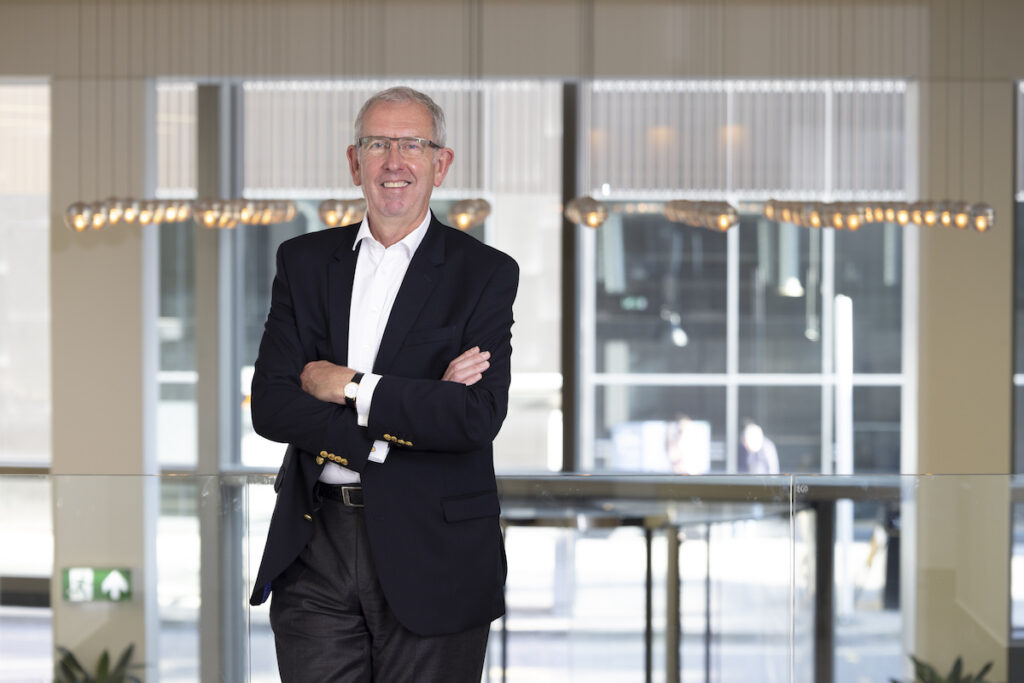Scottish Government innovation minister Richard Lochhead recently tagged InnoScot Health and other organisations into a LinkedIn post, stating: “I’m giving a lot of thought just now as to how we can ensure the whole is greater than the sum of the parts for Scotland’s growing and exciting, world shaping innovation sectors.”
As a formal NHS Scotland partner with over 20 years’ experience, we believe that continuously pondering and reassessing the same issue as Mr Lochhead is essential amidst our ever-evolving healthcare innovation ecosystem.
In a vacuum, no one can truly innovate at scale; it is a process which must invariably draw on other skillsets, other insights, to achieve its ambitions. Strengthening existing partnerships and bringing dynamic leadership across the triple helix of NHS, industry and academia is essential while being open and responsive to fresh opportunities to collaborate.
Where Scotland should be at an advantage, provided there is greater clarity within the currently cluttered landscape, is in its relatively small size and its multiple clusters of like-minded organisations with shared ambition at a key time of challenge and change.
So many great Scottish breakthroughs have resulted from such relationships, and they will continue to happen when silos are broken down; when expertise, trust, and the identification of mutual goals are brought to the fore.
That is the sturdy foundation on which the country’s future success is built; the optimal environment where forward-thinking solutions can be developed, tested, and adopted before being placed into patients’ hands to improve outcomes – not only for them, but also for NHS Scotland and for the nation’s wellbeing.
InnoScot Health is fully behind Scotland’s growing reputation as a world-leading entrepreneurial and innovative nation – it’s simply in the country’s DNA – and the notion that the triple helix can be extended as required to include entrepreneurs, funders, and voluntary sector partners will help us to encourage innovation and shape future healthcare in Scotland.
All are vital, fluid components in supporting InnoScot Health’s mission to inspire, accelerate, and commercialise impactful innovations for health, economic and social benefit. It can also mean looking externally to embrace international views, including Scottish ideas that have been successfully exported.
InnoScot Health is well connected across NHS health boards. Embedded within local NHS Research, Development and Innovation teams, we combine national oversight with targeted health board engagement and a strong digital presence. This not only provides local insight and intelligence, but also cultivates strong, trusted relationships.
Complementary to this is the well-established ability of InnoScot Health to work at a country-wide level to build strong connections wherever they are most opportune and beneficial.
We combine that with a proven ability to link relevant expertise across the sector, helping ensure that the vision of a connected, collaborative, inclusive Scotland is accelerated and realised.
Last year, we were proud to jointly announce a partnership with Heriot-Watt University which aims to fast-track innovation in medical and healthcare technologies and better understand clinical and nursing needs in Scotland.
The five-year agreement is seeing Heriot-Watt University’s Medical Device Manufacturing Centre (MDMC) collaborate with InnoScot Health to help bring new ideas and innovations from healthcare professionals to life.
Based at Heriot-Watt University’s Edinburgh campus, the MDMC is a consortium including the University of Edinburgh, the University of Glasgow and Robert Gordon University and helps Scotland’s SMEs to translate medical device concepts into commercial products. Offering free expert advice on, and access to, manufacturing engineering, regulatory issues, and funding, its staff provide technically supported access to its £2m specialist manufacturing facilities.
We at InnoScot Health are really proud to be part of this partnership and see the real value of combining expertise across the sector.
Such healthcare partnerships must be replicated across the country at this critical juncture – and the innovation minister can act as a lynchpin in helping to “ensure the whole is greater than the sum of the parts.”
Last week, he took a decisive step in championing Scotland as a leader in the development of ethical artificial intelligence (AI), telling investors and senior industry figures that Scotland is “open for business” as a pioneering global destination.
As part of the CogX event held in London, Mr Lochhead spotlighted the supportive environment he says is being developed in Scotland to foster the industry, including £24 million Scottish Government strategic investment in The Data Lab, the country’s innovation centre for data science and AI.
It is also the home of the Scottish AI Alliance, delivering the vision behind the country’s AI Strategy, and the University of Glasgow’s new Centre for Data Science and AI, which opened last week in a bid to tackle key global challenges through the innovative technologies.
The minister said: “We are, first and foremost, a land of invention, a pioneer in technology and an ideal place to invest and grow an AI business.
“Scotland is an outward-looking nation and is open for business. While rising to the challenges of this rapidly-evolving technology, we are also embracing the unprecedented economic opportunity it presents – just as we did for previous scientific and industrial revolutions.”
Mr Lochhead is to be applauded for his efforts to put Scotland on the map for AI, but he could well have been speaking about any number of the country’s areas of world-leading innovation expertise.
We at InnoScot Health insist there is a case to be made for further highlighting and streamlining Scotland’s many collective capabilities in healthcare innovation. Not just in the undoubted benefits that Scottish AI know-how can bring to the table, but also in its growing capabilities in medtech, precision medicine, digital health, robotics – and its ability to maximise opportunities to work collaboratively as part of a highly connected community.
